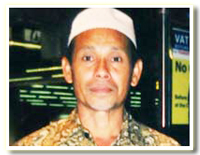A step forward in the right direction
 The Department of Special Investigation has been asked to investigate the disappearance of two Malay Muslims last seen on April 30, when eyewitnesses saw them entering the Naresuan border patrol police camp in Bannang Sata district of Yala. They were reportedly looking for their missing boat, believed impounded by the policemen there.
The Department of Special Investigation has been asked to investigate the disappearance of two Malay Muslims last seen on April 30, when eyewitnesses saw them entering the Naresuan border patrol police camp in Bannang Sata district of Yala. They were reportedly looking for their missing boat, believed impounded by the policemen there.
Prior to bringing the case to the DSI's attention through the Justice Ministry, relatives of the two missing persons - identified as Ibroheng Kahong and Dulhami Marae - had filed complaints with the Bannang Sata district police, the Southern Border Provinces Administration Centre and the Foundation of Muslim Lawyers Centre, but to no avail. According to Mr Ibroheng's wife, the SBPAC did confirm that her husband and his friend were missing, but refused to give any details as to how or why they had "disappeared".
This latest mystery brings to 35 the total number of persons gone missing in the strife-torn deep South since 2003, none of whom has ever been seen again.
Whether the DSI will prove more helpful than the existing agencies in the three southernmost provinces, remains a question mark in the minds of many Muslims, who maintain a deep distrust of state authorities.
This latest case of missing persons casts a very bad light on the Fourth Army Region, which is in full and direct command of the military, para-military and police forces in the region.
It also puts to the test a new policy approach initiated by Fourth Army Region commander Lt Gen Udomchai Thammasarorat, to re-investigate several cases of custodial deaths in order to ensure justice for the families of the victims.
The so-called "return of justice" policy is not an impromptu initiative by the military but a result of extensive discussions and in-depth analyses of the unrest in the region, wherein all stakeholders concurred that the sense of injustice or of justice denied that is felt by many Malay Muslims, is the main cause of the widespread resentment which ends up providing fertile ground for militant groups to enlist new recruits.
Prominent unresolved cases which are to be reopened include the mysterious death in custody of Sulaiman Nasae, whose body was found hanging from an iron bar in his detention cell at Ingkhayutthaboriharn camp in Pattani on May 30, 2010; and the fatal gun attack at Al Furgon mosque in Cho Airong district of Narathiwat on June 8, 2009, in which a dozen Muslim worshippers were killed by hooded gunmen, some of whom were believed to be para-military rangers.
In one unprecedented case, an out-of-court settlement was reached by the army, the police and the widow of Yapha Kaseng, the late imam of Ban Kortor mosque in Rueso district of Narathiwat, who was badly beaten up and died while in military custody three years ago.The sum of 5.2 million baht was given as compensation to the imam's family, although criminal proceedings are being pursued by the widow against five army officers and one police officer accused of direct involvement in the imam's death.
Whether or not the Fourth Army Region succeeds in winning over the hearts and minds of our sceptical Muslim brethren in the far South remains to be seen.
But the army's policy initiative to ensure justice, however belated, for the families which have lost loved ones through violence perpetrated by rogue officials, and for the families of missing persons, represents a gleam of hope. It is a step in the right direction and thus worthy of full support.
-----------------------------------------------------------------------------------------------
Caption : Mr Yapha Kaseng
Note : This article first published in Bangkokpost newspaper.
